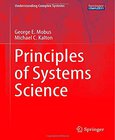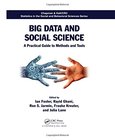Knowledge and Systems Science
Enabling Systemic Knowledge Synthesis

Book Details:
| Publisher: | Chapman and Hall/CRC |
| Series: | CRC Press |
| Author: | Yoshiteru Nakamori |
| Edition: | 1 |
| ISBN-10: | 1466593008 |
| ISBN-13: | 9781466593008 |
| Pages: | 246 |
| Published: | Jul 12 2013 |
| Posted: | Nov 19 2014 |
| Language: | English |
| Book format: | |
| Book size: | 11.45 MB |
Book Description:
Integrating ideas from the fields of systems science and knowledge science, Knowledge and Systems Science: Enabling Systemic Knowledge Synthesis shows how to create and justify various pieces of knowledge systemically. Written by one of the foremost experts in this area, the book presents approaches for the systemic integration of knowledge, which can help solve complex problems today and in the future. After discussing issues of systemic knowledge synthesis, the book emphasizes the importance of the human dimension in problem solving and introduces a new integrated systems approach called the informed systems approach. It also covers mathematical information aggregation techniques. Moving on to knowledge science concepts and approaches, the book discusses organizational and academic knowledge creation models and considers a sociological interpretation of the knowledge integration system. To support knowledge science as an academic discipline, the author explains how to justify knowledge and summarizes a theory of knowledge synthesis (construction) systems. Through case studies of technology archiving, academic research evaluation, demand forecasting of perishable foods, and other real-world concerns, this book demonstrates the use of new knowledge-based methods in addressing a variety of complex issues. It also illustrates the importance of acquiring a systemic view through trained intuition.
Download Link:
Related Books:
An Introduction to Systems Science
This is the first book that renders a thorough discussion of systems science. It draws on material from an extensive collection of external sources, including several other books and a special library collection complete with videotape empirical evidence of applicability of the theory to a wide variety of circumstances. This is essential because systems science must be responsive to diverse human situations of the widest difficulty, and it must fill the void that the specific sciences cannot fill, because these sciences are insensitive to the necessities of reconciling disparate views of multiple observers, and incorporating local conditions in hypotheses that precede inductive explorations....
Principles of Systems Science
This pioneering text provides a comprehensive introduction to systems structure, function, and modeling as applied in all fields of science and engineering. Systems understanding is increasingly recognized as a key to a more holistic education and greater problem solving skills, and is also reflected in the trend toward interdisciplinary approaches to research on complex phenomena. While the concepts and components of systems science will continue to be distributed throughout the various disciplines, undergraduate degree programs in systems science are also being developed, including at the authors own institutions. However, the subject is approached, systems science as a basis for understanding the components and drivers of phenomena at all scales s...
Big Data and Social Science
A Practical Guide to Methods and Tools
Both Traditional Students and Working Professionals Acquire the Skills to Analyze Social Problems. Big Data and Social Science: A Practical Guide to Methods and Tools shows how to apply data science to real-world problems in both research and the practice. The book provides practical guidance on combining methods and tools from computer science, statistics, and social science. This concrete approach is illustrated throughout using an important national problem, the quantitative study of innovation. The text draws on the expertise of prominent leaders in statistics, the social sciences, data science, and computer science to teach students how to use modern social science research principles as well as the best analytical and computational tools. It ...
2007 - 2021 © eBooks-IT.org



